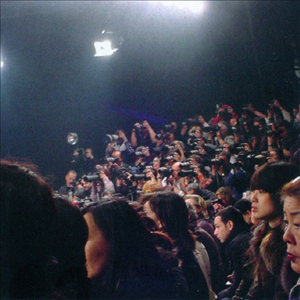Moritz von Oswald Trio Fetch
When a collaboration involves back catalogs packed with names like Basic Channel, Rhythm & Sound, […]

When a collaboration involves back catalogs packed with names like Basic Channel, Rhythm & Sound, Vocalcity, Mutila, Sun Electric, and nsi., it’s natural to expect something equally epochal. The Moritz von Oswald Trio has been delivering on that promise quietly while challenging our sonic expectations since debuting with Vertical Ascent in 2009. That said, even for confirmed fans of the group’s core participants—Moritz von Oswald, Sasu Ripatti (a.k.a. Vladislav Delay), and Max Loderbauer—there’s no retreading past achievements happening here. This is still dub techno, but the project works within an improvisational, exploratory framework that belongs to jazz more than a sequencer grid, and listeners have to relearn how to move through this seemingly alien space every time they take the plunge. Now four albums into its run, the Trio is still demonstrating that there’s always something new under the sun, even for these decorated techno veterans. The music is startlingly different on the surface than what we expect, but its existence, and the level of quality maintained over the outfit’s releases, make for an elegant gob of spit in the face of an ever-accelerating culture that increasingly appears to have less and less to say.
Fetch is the name of the latest installment, opening with the 18-minute “Jam.” It’s a functional, literal title that replaces the group’s former utilitarian track-naming technique (“Pattern 1,” “Structure 2,” “Nothing 3,” etc.). “Jamming” has most recently been a byword for visceral, handmade electronic music of the Blondes and 100% Silk varieties, a thread leading younger artists back to the clunky propulsion of early, raw house and techno but which often leaves little space for sounds to unfold in. “Jam” is as dark and suggestive as the album’s cover photograph, its debt to jazz underlined by inky fusion trumpet lines provided by Sebastian Studnitzky and double bass from ECM’s Marc Muellbauer. Max Loderbauer is joined by nsi. bandmate Tobias Freund to add live FX, snatching and refashioning bits of Oswald’s and Ripatti’s bare-bones electronics and their collaborators’ acoustic instruments to create a sense of scale, space, and boundary. As with dub, the interest isn’t just in the ghostly double trailing in the background or the skeleton up front, but the dialectical push and pull between the two. “Club” and “Yangissa” also top the 10-minute mark, but with a greater sense of linear progression in comparison to “Jam”‘s swirls and eddies; “Dark” comes closest to conventional dance music, but its menacing pace and slo-mo pachinko sound effects make it feel like it’s being played at the wrong speed. Yet try playing it at 45 and you’ll find that the atmosphere has evaporated on you.
So, like previous MVOT releases, Fetch has an unresolved feeling across its four tracks. It’s not an unsatisfying lack of resolution, rather the sensation that more avenues have been opened up than can be explored on two sides of vinyl. The music’s restrained enough that it could bubble along pleasantly for twice its actual length without complaint. It exists with quiet defiance outside of the economy of attention, buzz, shareability, and curation that makes up the current listening environment. But if the listener lets his or her attention stray, the music can quickly become irritating—all that can be heard is arid drum-machine patter. Those looking to properly share Fetch will have to invite their friends over, sit down on the same couch with some nettle tea, and let things happen in the fullness of time, as opposed to simply flinging the album into a Spotify inbox. The music grows in richness with ritual, an evolution from the material scarcity and obscurity of Basic Channel releases (with CDs famously packaged in metal boxes that would effectively destroy them); now, we’re confronted by our own lack of patience. Regardless of genre, that kind of challenge isn’t something that’s leveraged too often in music these days. Perhaps in another few years, deep-listening improv dub techno will be a codified genre unto itself, but for now, it’s developing into a flexible new musical vocabulary, one guided by the light touch of a few geniuses just hanging out and seeing what happens.

